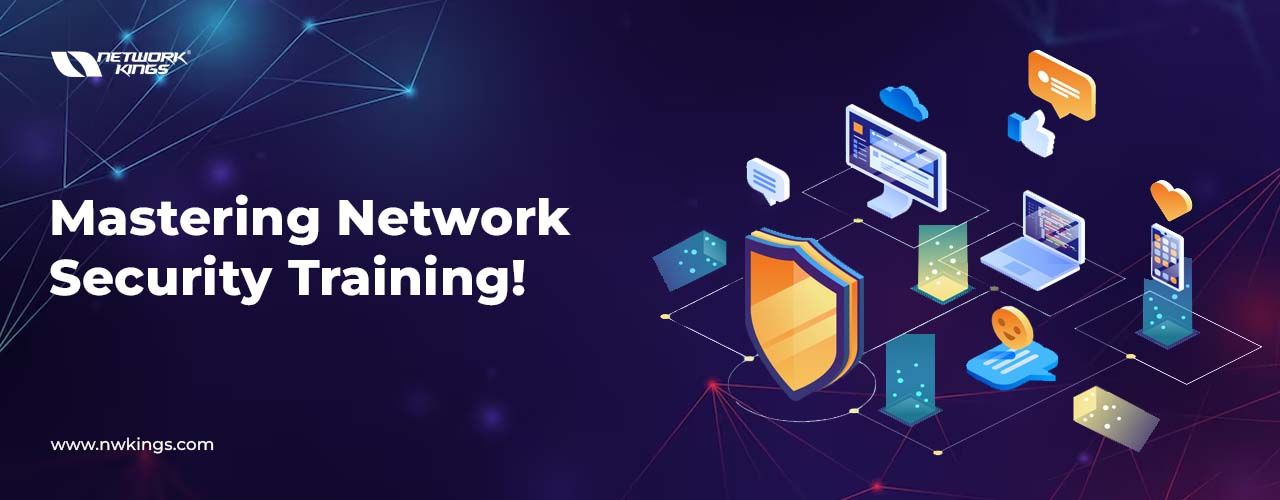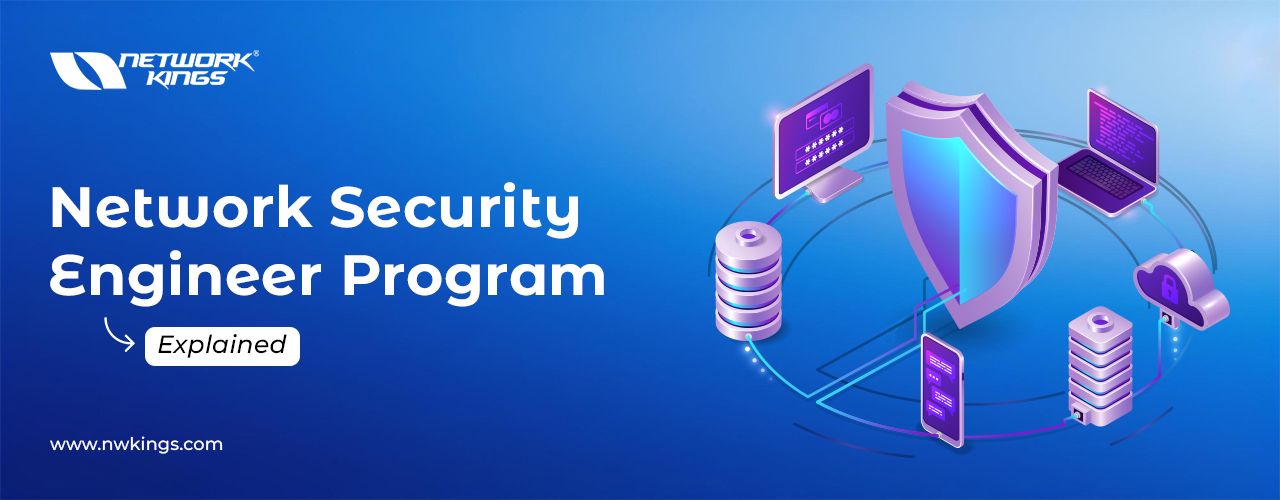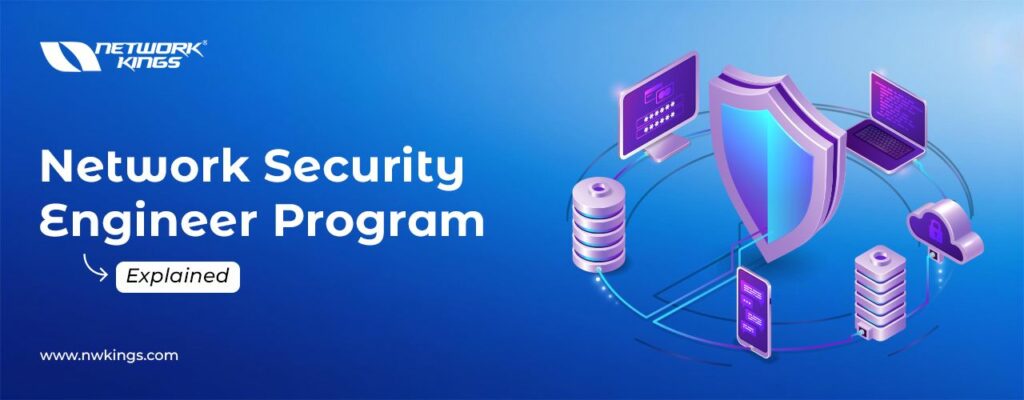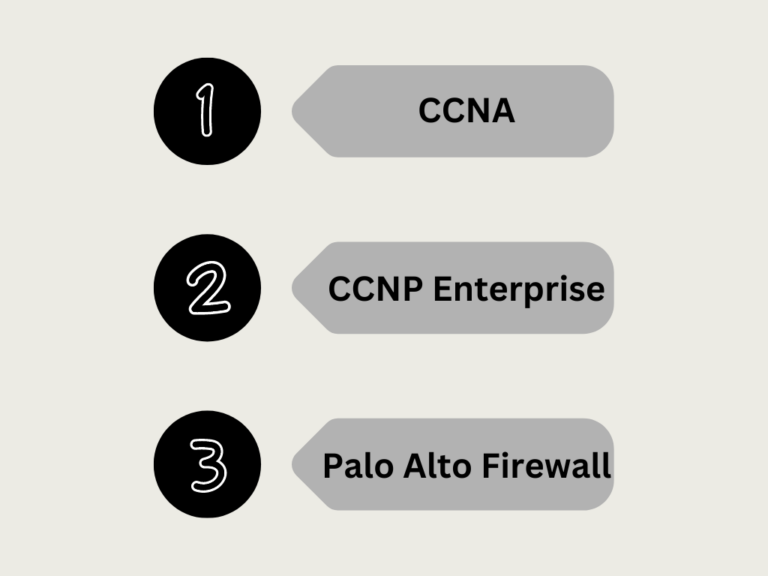
Are you looking for the best Network Security Engineer training? A network security engineer safeguards systems from cyber threats, comprising bugs, malware, and hacking attempts. The IT professional should be able to determine existing issues and build protection to avoid future threats. Testing and configuration of hardware and software systems is a part of Network Security Training.
A threat landscape is an effective analysis of every probable and determined threat within a given context or sector. It gives knowledge of the multiple risks and exposures that individuals, organizations, or systems may undergo in a particular setting.
Network Security Engineer course helps employees comprehend the significance of cybersecurity and instructs them on how to recognize potential threats and answer suitably. Security awareness training also equips employees with the knowledge and skills to recognize, report, and thwart security incidents.
What is Network Security Engineering?
Network security is a well-defined method of defending a computer network infrastructure against network interruption. As security pressures become more refined, the necessity for businesses to alter has become critical.
Network Security defends your network and data from violations, intrusions, and other threats. This is a vast and overarching term that represents hardware and software solutions as well as processes or rules and configurations connecting to network use, accessibility, and all-around threat protection.
What are the Job roles and responsibilities of a Network Security Engineer?
Here are the job roles and responsibilities of a Network security engineer:
- Managing LAN, WLAN, and architecture of the server according to the business policy
- As a preventive measure, optimize and execute new security protocols for more splendid efficiency against any threat or malfunctions.
- Enforce a virus detection system ahead for sound protection.
- Fixing the current security issues including hardware malfunctions
- Tracking the vulnerable scripts to avert potential threats
- Generating and holding the virtual private network, firewalls, web protocols, and email security etiquette.
- Noting the security analysis of findings.
- Strengthening the regulatory systems about ISMS policy (Information System Management Systems)
- Analyses of Security breach alert.
- Developing the security authentication protocol.
- Preserving server and switches
- Maintaining & implementing the SOP for Network security.
- Reporting hardware and software products as per designated policies.
- Overseeing the building of new software and hardware
- Suggest modifications in legal, technical and regulatory areas that impact IT security.
- Facts of performing routing protocols (MPLS, HAIPE/IP, QOS, and WAN).
- Monitoring of web security gateways, perimeter security, network access controls, and endpoint security.
What are the Skills required to become a Network Security Engineer?
Skills and dexterities best suited for careers in network security include:
- Analytical skills for absolutely examining computer systems and networks and for determining exposures.
- An awareness of detail that stops stealthy cyber attacks
- Resourcefulness or creativity for predicting security risks and executing new ways to neutralize them.
- Problem-solving skills for quickly locating and improving network defects.
- Communication skills to introduce co-workers and managers to threats and security protocols.
Technical network security engineer skills:
- Details of current information security trends.
- IT networking and programming skills.
- Capacity to test for, track, and determine threats, including malfunctions and attacks.
- Security protocol-building skills, including authentication systems.
- Capacity to assist firewalls, routers, virtual private networks (VPNs), and other security tools.
- Ability to support server, LAN, and WAN architecture.
- Infrastructure documentation and event reporting abilities.
- Understanding of cyber laws and compliance.
Types of Network Security Engineer Training
Formal Education Programs
- Bachelor’s and Master’s Degrees in Network Security: You can pursue a Master’s degree in Cybersecurity, Computer Science, Computer Engineering, IT, Information Assurance, and Information Security and a Bachelor’s degree like a Bachelor’s in Cybersecurity, Bachelor in Cyber security [Hons.], B.Sc in cybersecurity and Level Tech track, B.Sc in Cybersecurity Engineering, and BA in Cybersecurity.
- Certificate and Diploma Programs: You can pursue certificate and diploma programs like a Diploma in Cyber Security Risk Management with Co-OP, a Diploma in Cybersecurity, a Level-3 Foundation Diploma in IT, a Diploma of IT, a Qualifi level-5 in Cybersecurity, Cybersecurity Investigation and threats technology [CITT], Information Security Engineering Technology Diploma, and Level-2 diploma.
Online Learning Platforms
- Leading Platforms for Network Security Courses: There are numerous online platforms to provide Network Security Courses. One such platform is Network Kings which offers Network Security courses like CeH v12, CISSP Training, CompTIA Pentest+, CompTIA A+, CompTIA Security+, CompTIA Network+, and CompTIA CySA.
What are the top Network Security Engineer Courses?
Here is the top Network Security Engineer Training Courses:
CeH v12:
A Certified Ethical Hacker (CEH) course is a skilled professional training program that covers a wide range of topics, including network security, cryptography, web application security, and system hacking. The sole purpose of the CEH course is to recognize individuals who have demonstrated the knowledge and skills to understand and identify weaknesses and vulnerabilities in a computer system through CEH training. During the course program, you will learn to prevent the chance of any malicious hacking that can exploit the system if not detected on time. The CEH Certification course has a global recognition that imitates the skills and techniques of Hostile Hackers.
You will learn Penetration Testing, Ethical Hacking Vulnerability Assessment, and much more with CEH V12 course certification.
Exam Format of CeH V12:
Exam Name Certified Ethical Hacker (312-50)
Exam Cost USD 550
Exam Format Multiple Choice
Total Questions 125 Questions
Passing Score 60% to 85%
Exam Duration 4 Hours
Languages English
Testing Center Pearson Vue
Eligibility of CeHv12 Training:
- Graduation
- Basic understanding of the IT industry
- 2-3 years of experience in Networking
- Basic understanding of Servers
- Understanding Ethical Hacking
- Fundamental knowledge of Cloud management
CISSP Training:
The CISSP training program comprises designing, implementing, and managing best-in-class cybersecurity programs. With a CISSP certification, one can validate the expertise and evolve as an (ISC)² member by opening an expansive exhibition of premier resources, scholarly devices, and peer-to-peer networking possibilities.
Eligibility of CISSP training: The CISSP training program comprises designing, implementing, and managing best-in-class cybersecurity programs. With a CISSP certification, one can validate the expertise and evolve as an (ISC)² member by opening an expansive exhibition of premier resources, scholarly devices, and peer-to-peer networking possibilities.
Exam Code of CISSP training:
Exam Name ISC2 Certified Information Systems Security Professional
Exam Code CISSP
Exam Cost USD 749
Exam Duration 4 hours
Number of Questions 125-175
Exam Format Multiple choice and advanced innovative questions
Passing Marks 700/1000 points
Exam Language English
Testing Center (ISC)^2 authorized PPC, PVTC Select Pearson VUE tests
Eligibility of CISSP training:
- Graduation
- Basic understanding of the IT industry
- A minimum of 5 years of work experience
- Any ISC2-approved course certification (Preferred)
- 1-2 years of experience in developing and maintaining Cisco Applications
- Fundamental knowledge of Programming Language
CompTIA Pentest+:
The CompTIA PenTest+ Certification course provides the skills required to plan, scan, and perform vulnerability and penetration testing as it is both, a knowledge-based and performance-based PenTest+ exam. Since the PenTest+ course refers to the practice of testing a computer system, network, or web application to find security vulnerabilities that can be damaged by malicious cyber attacks, CompTIA PenTest+ training covers the security of all the technologies. It is the only exam available to date that covers all the vulnerability management requirements. The exam includes cloud, hybrid environment, web applications, Internet of Things (IoT), and traditional on-premises testing skills.
Exam format of CompTIA PenTest+:
Exam Code PT0-002
Number of Questions Maximum of 85 questions
Exam Cost $392
Type of Questions Performance-based and multiple-choice
Length of Test 165 minutes
Passing Score 750 (on a scale of 100-900)
Languages English, Japanese, Portuguese, and Thai
Testing Provider Pearson VUE
Eligibility of CompTIA PenTest+
- Graduation
- Basic understanding of the IT industry
- Basic understanding of Networking
- Understanding Security fundamentals
- 3-4 years of experience in IT Security
CompTIA Security+:
The CompTIA Security+ course with certification is offered by the non-profit trade association CompTIA which focuses on providing interactive information along with managing the risks. CompTIA Security+ training is considered an entry-level credential of CyberSecurity which helps in learning all the foundational skills that demand cybersecurity skills, including system administrator, security administrator, and network administrator for IT Jobs.
Exam Format of CompTIA Security+:
Exam Code SY0-601
Number of Questions Maximum of 90 questions
Type of Questions Multiple choice and performance-based
Length of Test 90 minutes
Passing Score 750
Exam Cost USD 392
Testing Provider Pearson VUE
Languages English, Japanese, Vietnamese, Thai, Portuguese
CompTIA A+:
The CompTIA A+ course with certification is offered by the non-profit trade association CompTIA which focuses on providing all the knowledge and skills associated with the Initial Security Protocols in IT Systems and also teaches how to run and manage different kinds of OS on Multiple Devices at the same time. CompTIA A+ training also prepares you to learn and run the basic level Data Backup and Recovery Services. A+ course is considered a certification course that can brush up your skills in troubleshooting and supporting and maintenance of IT Infrastructure.
Exam Code for CompTIA A+
Exam Code Core 1 (220-1101), Core 2 (220-1102)
Degree Certificate
Duration Course Duration of CompTIA A+ is 10+ Hours.
Qualification Graduate
Average Salary Upto INR 2+ LPA
Eligibility of CompTIA A+
- Graduation
- Basic understanding of the IT industry
- 9-12 months of experience in Networking
- Basic understanding of Data Recovery
- Understanding Security domains
- Fundamental knowledge of Risk Management
CompTIA Network+:
The CompTIA Network+ course with certification is offered by the non-profit trade association CompTIA which helps you learn the skills essential to establish, maintain, and troubleshoot important networks without any threat or danger as a lot of businesses are dependent on those networks. CompTIA Network+ training also prepares you to provide support to networks on any kind of platform. The CompTIA Network+ course is known to be the way to progress for those Individuals who want to carry on further to the path of CompTIA’s Network+ training certification as it helps in designing and implementing functional networks.
Exam format of CompTIA Network+
Exam Code N10-008
Exam Cost USD 338
Number of Questions 90
Types of Questions Multiple-choice, performance-based
Exam Duration 90 minutes
Passing Marks 720 out of 900
Exam Language English, Japanese, Vietnamese, Thai, Portuguese
Experience Needed Over 9-12 months
Expiry After Three years
Eligibility of CompTIA Network+
- Graduation
- Basic understanding of the IT industry
- 9-12 months of experience in Networking
- Basic understanding of Troubleshooting
- Fundamental knowledge of Risk Management
- CompTIA A+ Certification is required
CompTIA CySA+:
The CompTIA CySA+ course with certification is offered by the non-profit trade association CompTIA which helps you in emphasizing software and application security, automation, threat hunting, and IT regulatory compliance, which affects the daily work of security analysts.
CompTIA CySA+ training is known to be the only intermediate high-stakes CyberSecurity analyst certification that leads to the learning of-
- The most updated core security analytical skills
- The latest technologies for stopping threats related to the Security Operations Center (SOC)
- Intelligence and threat detection techniques
- Analyze and interpret data
- Apply proactive threat intelligence
- The analytics-based approach in the IT security industry
Exam Format of CySA+
Exam Name CompTIA CySA+
Exam Code CS0-003
Exam Cost USD 392
Exam Format Multiple-choice and performance-based questions
Total Questions 85 questions
Passing Score 750/900
Exam Duration 165 minutes
Languages English, Japanese, Portuguese, and Spanish
Testing Center Pearson VUE
Eligibility of CySA+
- Graduation
- Basic understanding of the IT industry
- 3-4 years of experience in Information Security
- Basic understanding of Data Security
- Fundamental knowledge of CyberSecurity
- CompTIA Security+ or CompTIA Network+ Certification is required
How to become a Network Security Engineer?
To become a Network Security Engineer you can follow these steps:
Obtain a degree: Earn a bachelor’s degree in a relevant subject together with Computer Science, Information Technology, or Cybersecurity. This will provide you with a strong foundation in networking and protection standards.
Gain experience: Seek internships, access-level positions, or volunteer opportunities in IT or cybersecurity to benefit realistic experience in network protection. This will help you increase your abilties and expertise of network infrastructure and protection practices.
Certifications: Some of the relevant examples of Network Security Engineer Certifications are:
- CISSP: Certified Information Systems Security Professional
- CISM: Certified Information Security Manager
- CompTIA Security+
- GSEC: SANS GIAC Security Essentials
- Cisco CCIE Security
- Juniper Networks JNCIE Security
- Palo Alto Networks Certified Network Security Engineer (PCNSE)
- CCNA.
Specialize in network protection: Focus on obtaining specialized knowledge in network security technology, protocols, and tools. Stay up to date with the cutting-edge traits and traits within the discipline through non-stop studying and expert development.
Build a robust foundation: Develop a robust expertise of networking concepts, protocols, and architectures. Familiarize yourself with firewalls, intrusion detection systems, digital personal networks (VPNs), and different protection technology.
Stay updated: Network safety is an ever-evolving discipline. Stay up to date with the modern-day protection threats, vulnerabilities, and mitigation strategies. Follow industry blogs, forums, and attend relevant conferences or webinars to stay knowledgeable.
Gain practical experience: Look for possibilities to paintings on real-world community protection tasks or participate in cybersecurity competitions to apply your expertise and decorate your sensible skills.
Communication skills: Network protection engineers work collaboratively with different IT specialists and stakeholders. Strong communication and interpersonal competencies are critical to efficaciously communicate security dangers, answers, and recommendations.
NOTE: Remember, becoming a Network Security Engineer requires continuous learning and staying updated with the latest industry trends.
Why Network Kings to pursue Network Security Engineer Training?
Network Kings is fulfilling its mission to teach students and contribute at least 1M Engineers. Network Kings is working continuously to fulfill their mission. Here are the reasons why you must pursue Network Security Engineer course with Network Kings:
- Networking: Build your network with our team to connect with them for the best Networking training.
- Comprehend with the best: Learn from industry professional experts.
- Structured Learning: Network King’s curriculum gives the best learning experience, designed by professionals.
- Gain Certification: You will get certification with our free Networking certification course. It will improve your resume and career opportunities.
- World’s largest labs: Network Kings have 24/7 access to virtual labs with zero downtime.
- Career Guidance: With Network Kings, you will get a career consultant via career consultants.
- Tricks for Interviews: Network Kings will offer tips and tricks to crack interviews and AWS exams.
- Recorded lectures: With recorded lectures, you will get access to the recorded lectures to learn at flexible hours progress
What are the job opportunities after Network Security Engineer course?
Here are the job opportunities after Network Security Engineer Training:
- CyberSecurity Trainers
- Security Engineer L3
- Network Security Professional
- Salesforce Administration Security Engineer Accenture
- Trainee Cyber Security
- Security Engineer L3
- Chief Information Security Engineer
- Security Architect
- Cybersecurity Engineer
- Malware Analyst
- Penetration Tester
- Computer Forensic Analyst
- Application Security Engineer
- Cloud Security Specialist
- Database Administrator
- Incident Manager
What are the salary expectations after the Network Security Engineer Training?
Here are the salary expectations after the Network Security Engineer Training in different countries:
- United States: USD 100,000 – USD 200,000 per year
- Canada: CAD 80,000 – CAD 150,000 per year
- United Kingdom: $70,000 – $120,000 per year
- Germany: $60,000 – $120,000 per year
- France: $60,000 – $100,000 per year
- Australia: AUD 80,000 – AUD 140,000 per year
- United Arab Emirates: $60,000 – $120,000 per year
- Saudi Arabia: $50,000 – $100,000 per year
- Singapore: $60,000 – $120,000 per year
- India: INR 20,000 – INR 70,000 per year
- China: $50,000 – $100,000 per year
- Japan: $70,000 – $120,000 per year
- South Africa: $30,000 – $70,000 per year
- Brazil: $30,000 – $70,000 per year
- Mexico: $30,000 – $60,000 per year








